Requiem for a soldier I never really knew
"The Final Salute" honored 20 veterans, five spouses at Iowa Veterans Cemetery
“I always meant to ask you about the war
”And what you saw across a bridge too far
”Did it leave a scar?”
—-”Bang the Drum Slowly,” Emmylou Harris/Guy Clark
ADEL — You might say it’s been a cathartic week.
I had the opportunity, and the privilege, to honor a member of my family who served in World War II.
I only peripherally knew about him in life. I learned much more about him in death.
Harry Adrian Gardner was my uncle, my mother’s brother. I remember seeing him only once in my life almost 60 years ago, when I was about eight years old.
We knew him as Uncle Adrian, and that he’d lost an arm in a work accident many years earlier.
He was estranged from the family for a host of reasons I know only part of secondhand and don’t need to go into here. But one fact that should be talked about is that he served our country honorably in World War II, prior to the accident that cost him his arm.
I reached out to him in February 2023 in my capacity as an oral historian with the Grout Museum District’s Sullivan Brothers Iowa Veterans Museum, as part of our “Voices of Iowa” oral history project.
After I learned where he was — in assisted living in Pleasantville in Marion County — I wrote him and enclosed a replica World War II Victory Medal I’d purchased to honor him for an 80th anniversary World War II exhibit we’d had at the museum. I’d also purchased one for my late father and Adrian’s brother, his last surviving sibling, my Uncle John Gardner, also now deceased. Uncle John had told me of Adrian’s service — that he’d served in the Philippines and had been decorated for bravery. Adrian’s care staff had recommended I write him because he was hearing impaired.
In my letter to Uncle Adrian, I asked to interview him and get acquainted. Regardless of his answer, I asked him to accept the replica medal with my best wishes and thanked him for his service.
There was no response. In October, our family received word Adrian has passed away at age 97.
Fortunately, the story didn’t end there.
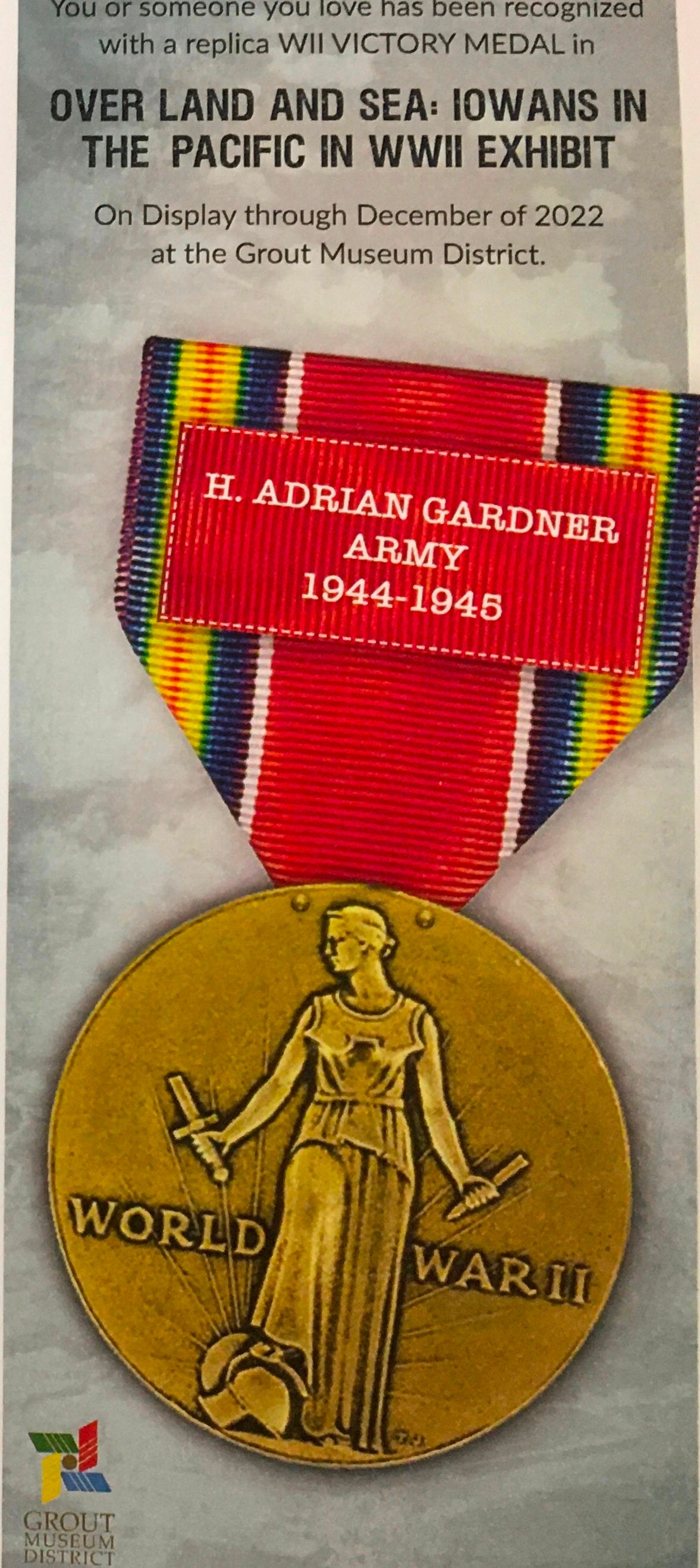
When Uncle Adrian passed away, Marion County Sheriff Jason Sandholdt, who had guardianship over him, contacted Des Moines funeral director Lanae Strovers, organizer of “The Final Salute.” It is an event ensuring deceased veterans who are alone or separated from family and loved ones, for whatever reason, are laid to rest with proper military honors.
Uncle Adrian was one of 20 veterans and five spouses of veterans laid to rest at the Iowa Veterans Cemetery near Adel Friday, Sept. 27, preceded by services at West Des Moines Christian Church.
It’s become an annual event over the past several years. This year’s ceremony included interment of a Civil War veteran, Joseph Chedester, a native Tennessean who served in the Union Army. Other veterans of the two world wars and other eras also were interred, representing all branches of service, whose remains had gone unclaimed for years or decades. This year’s group was the largest interred to date.
As part of conversations with Sheriff Lindholdt and Lanae Strovers, I was provided with a copy of Uncle Adrian’s military discharge papers. He was born in La Porte City and living and working in Waterloo when he was inducted into the Army in late 1944. He served in the Pacific as a rifleman with Troop G of the 12th Cavalry Regiment, part of the 1st Cavalry Division.
According to a regimental history, the 12th Cavalry participated in the liberation of Luzon, the largest island in the Philippines, in fierce fighting after nearly four years of occupation by the Japanese Imperial Army and the murder of some 150,000 Filipino civilians over that time. Uncle Adrian arrived in the Pacific May 7, 1945 and the Luzon liberation was concluded June 30, so he would have participated in that operation, which included the capture of the Japanese military headquarters at Sariaya.
Uncle Adrian served from Dec. 2, 1944 to Nov. 11, 1946 and received the Asiatic Pacific Theater Ribbon with one bronze battle star, the Philippine Liberation Ribbon, the World War II Victory Medal and the Army of Occupation Medal for Japan. His regiment had occupation duty at Camp McGill at Otawa near Yokohama after the war’s end — among the first U.S. troops to set foot on Japan’s home islands.
I’d offered to accept Adrian’s folded flag as part of the services. Lanae told me she’d arranged for a 102-year-old fellow World War II veteran, Howard McDonald of the Des Moines area. to perform that service.
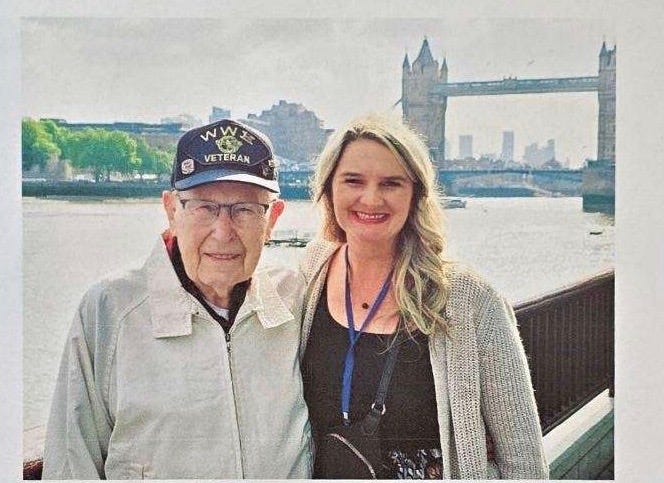
Howard served in the 23rd Division Special Troops — Gen. George S. Patton Jr.’s “Ghost Army,” set up in England to fool the Germans about the June 6, 1944 D-Day invasion of occupied France. Harold transmitted bogus radio signals as part of the overall deception, conning the Nazis into thinking the swashbuckling, controversial Patton would lead the main invasion force at the Pas-de-Calais, about 230 miles east of the actual invasion beaches.
I was thrilled and extremely honored to have Harold be part of Uncle Adrian’s military honors, as a World War II brother in arms, along with Sheriff Sandholdt and Deana Lawrence, a caregiver for Uncle Adrian at Accura Healthcare of Pleasantville. Sheriff Sandholdt, members of the Second Brigade Motorcycle Club in central Iowa and other biker groups escorted Uncle Adrian’s remains to the church.
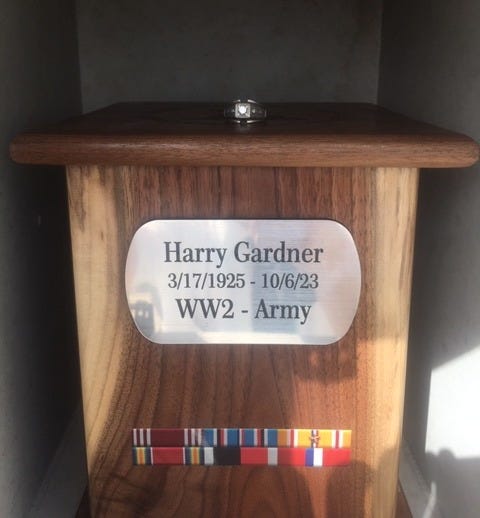
The Cedar Valley was well represented at “The Final Salute.” Members of local veteran motorcycle clubs participated. Kelly Sullivan, granddaughter and grandniece of Waterloo’s five Sullivan Brothers who died together during World War II, received the flag for an unclaimed Navy veteran and Purple Heart recipient.
Waterloo native Mike Olson, legislative liaison for the Iowa Department of Veteran Affairs, also was a ceremonial flag recipient and served as one of the storytellers at the church service, recounting the stories of the Army veterans to be interred. Capt. Tim Hadley, chaplain for the Waterloo-headquartered Iowa Army National Guard 1st Battalion, 133rd Infantry Regiment, led the gathering in prayer at the church and cemetery.
Veterans and individuals from all over the state and at least one from Minnesota participated. Urns containing the veterans’ remains were manufactured by industrial arts students from the PCM (Prairie City-Monroe) school district.
After the ceremonies at the cemetery, I was presented with Uncle Adrian’s encased flag by Sheriff Sandholdt and one of the event organizers. I was emotionally overwhelmed. I was also able to walk with Deana Lawrence as she carried Uncle Adrian’s urn to its final resting place.
Sheriff Sandholdt had some of Uncle Adrian’s personal effects. In his billfold, we discovered a slip of paper with my name and current phone number. So I know he received my letter from February 2023, and he and/or one of his caregivers took it to heart enough to keep my number.
I was blessed to have had the opportunity to pay proper respects to Uncle Adrian’s military service, thanks to some good people who did the right thing.
I felt I owed him that much. So do we all, for all those who stand the watch for liberty.
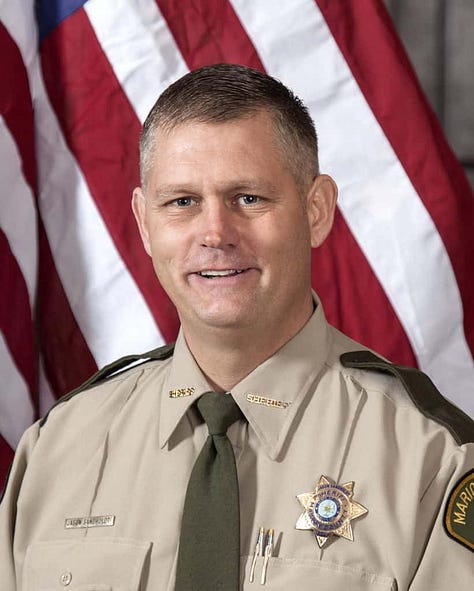
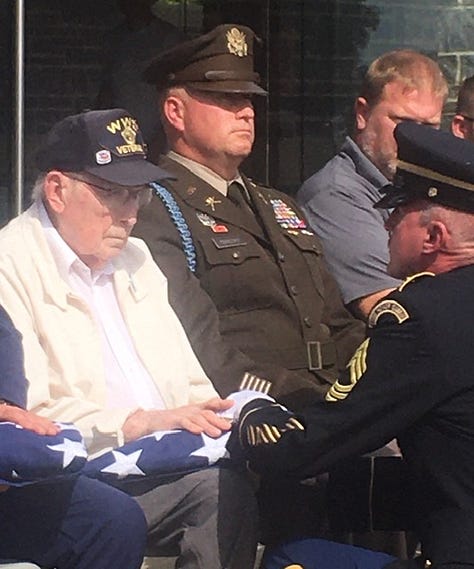
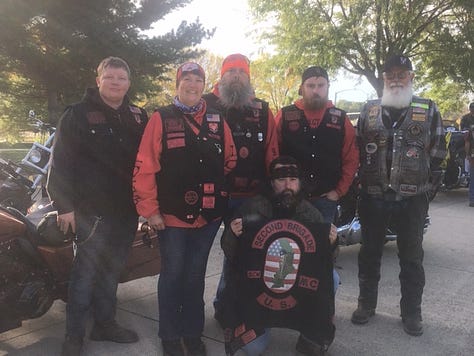
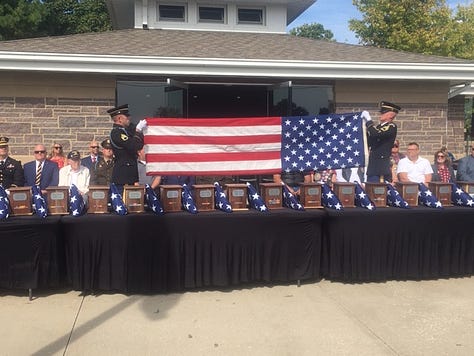

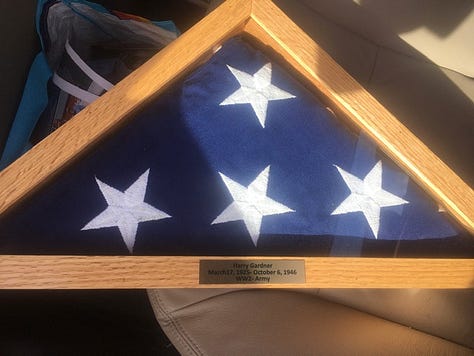
Pat Kinney is a freelance writer and former longtime news staffer with the Waterloo-Cedar Falls Courier and, prior to that, several years at the Ames Tribune. He is currently an oral historian with the Grout Museum District in Waterloo. His “View from the Cedar Valley” column is part of “Iowa Writers Collaborative,” a collection of news and opinion writers from around the state who previously and currently work with a host of Iowa newspapers, news organizations and other publications. They are listed below. Clink on the links to check them out, subscribe for free - and, if you believe in the value of quality journalism, support this column and/or any of theirs with a paid subscription .
The Iowa Writers’ Collaborative

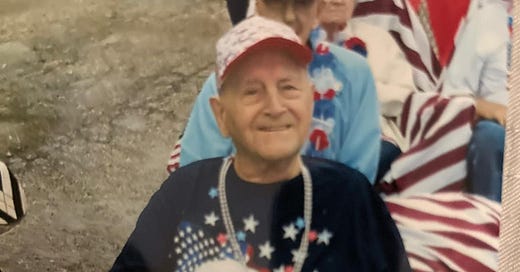



I think this is the perfect time to tell you a story of another of Iowa's WWII veterans that few have ever heard of, John Onken. I went searching for his grave since he is listed as one of Jones Counties veterans and is distantly related to my wife. It took awhile to find he was buried in Illinois, in a graveyard near his brothers home. Before WWI he had a very confusing life, he was born in Illinois to German parents who decided they needed to go back to Germany since they hadn't applied for citizenship here. They faced potential imprisonment as "enemy alliens". if they didn't leave before the war started. So John and his brother who both had been born in the US , followed along. Unfortunately their father was drafted in the service of Germany and was killed during the final weeks of the war in France. After the war ended, Germany was plunged into a very deep recession attempting to pay off the war debt. The boys decided to return to the US since they were citizens , how they ever afforded the passage is still a question! John was the younger of the two and had never learned English, his brother, being somewhat older had a better command of the langeuage and decided to return to Ilinois . John, on the other hand, contacted his uncle John Heyen in Langworthy Iowa to see if he could live with him till he got his "sea legs" under him and be able to speak the language. He had an advantage here because he did speak Platt, or low German, and many of the farmers in and around Langworthy spoke a version of Platt that was much earlier but easy enough to figure out. He was well liked among the farmers and never failed to have work even in the darkest days of the depression here. On a fateful day in December, 1941, he was working on the Henry Jacobs farm on a Sunday, attempting to get a windmill working that had stopped. Henry's wife was a cousin to my father and one day visiting with his daughter, Dorothy Nagel, I heard this very heart felt story from Dorothy. She told me how much she liked John, growing up around him. But this day would always stay in her memory. Her mother had come out on the porch to tell everyone that the Japanese had just bombed Pearl Harbor. Everyone was shocked by the news, but what stuck in Dorothy's mind is what John said, "Well now that there is war, I'll have to go, but I probably won't be coming back." As it turned out, John was soon drafted and ended up in the Dakotas in the horse cavalry, which soon was mechanized and later sent to England. John had been assigned to a "Scout" outfit, and as a result ended up on one ot two boats headed for two Islands off the coast of Normandy proceeding the invasion by literally hours. The Germans had control of these two islands, it was thought that the islands had been abandoned, but fear of command detinated mines on the beaches where the troops would soon be landing made it imparative they make sure there were no Germans left. Two of the Scout outfit were killed that night, one from each boat. I have not discovered who the second one was as he died on the other island. Unfortunately John stepped on a mine and died as a result. No Germans were on either island. John's body was taken back to England and buried there. I put this story on the web and it was picked up by the people in Virginia who had the most people die at Normandy from one small town.. They had built a memorial to all those who died on that first day of the Normandy invasion from the US, but John was not included on the monument. They wanted to invite those related to John to come to Virginia for the dedication of his name on the monument! I Unfortunately had to tell him that we couldn't make it and most of his closest relatives were citizens of Germany! On retrospect, because John was considered to be one of those who died at Normandy and was on this mission before the invasion started, he would likely be considered either the first or the second to die at Normandy during the invasion! Fortunately his brother survived Normandy and returned to Illinois. He too had passed prior to this dedication, but at least he survived the war. By his request, John was brought to Illimois for burial after the war. Two years ago, while in Germany celebrating my birthday with distant relatives, we mentioned that some of ohn Onkens relatives had lived in the area. As it happened a nephew of John's lived only a few houses away and was at home at the time! We showed him a picture of John and the first thing he said was, "Oh, my uncle John!" .
Excellent article. Thank you!